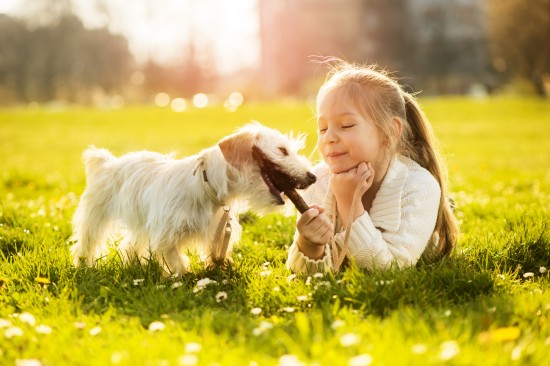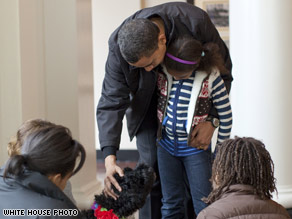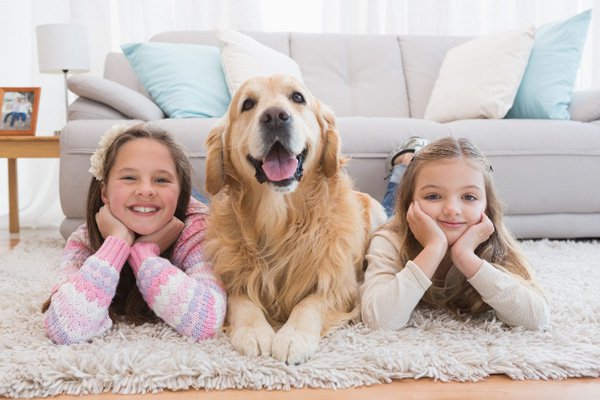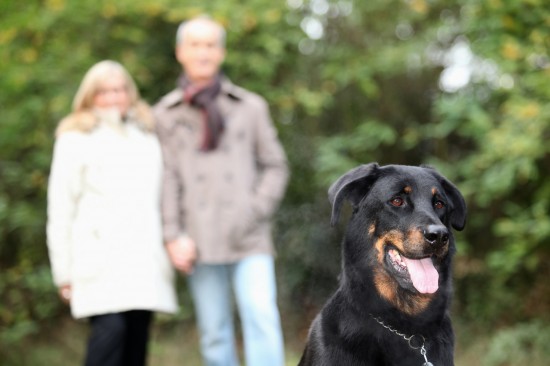

Bringing home a new puppy for your family and teaching your children about dogs and how to care for them can be a very formative life experience for both you and your kids, as well as a rather steep learning curve! While there will of course be the odd slip-up or mistake along the way, it is important that you carefully supervise your children’s interactions with your puppy, to ensure that they treat it appropriately and do not tease, hurt or bully it.
While a puppy is young and learning about their world, the experiences they have with people will go on to form the basis of their understanding of people, which will have an impact upon the whole rest of their lives. If your puppy is unhappy, teased or treated roughly during this time, they will learn that people are to be feared, and will grow up to be unhappy, shy, fearful, and even possibly aggressive.
Between the ages of three and twelve weeks old, your puppy begins to learn most of his social behaviours and boundaries. At this age the pup will also be very small and vulnerable, and unable to defend themselves or get away from situations that they do not like. During this time, rough handling, bullying, teasing or any other unkindness will have a particularly amplified effect on how the pup will view people later on in life, and teaches your puppy that people are not a good thing.
Learned experiences and reactions that your puppy has picked up prior to the age of eighteen weeks old can be very hard to correct or reverse later on.
When a puppy is very young and cannot get away from someone who is teasing or bullying them, they will soon move on to growling, snarling, biting or nipping in an attempt to defend themselves. While this might at first seem funny when the puppy is little and harmless, as well as the consideration that such behaviour is negatively affecting your puppy’s happiness and feeling of security, as they get bigger, these aggressive cues will become more serious.
A puppy that is teased or comes to dread the approach of children or one person in particular will soon become defensive and protective of themselves, sometimes acting first to warn off the approach or even biting and acting aggressively. This is very hard to turn around later on, and of course, comes accompanied by a great many risks for both the puppy and the people that they live with.
Rough and tumble play, and inciting your puppy to bite at your feet or hands in play can also have negative consequences later on, as these things will teach the puppy that that type of behaviour is desirable and acceptable, and as they get older, they will continue to repeat it.
Any stimulus that causes pain or discomfort for your puppy or that causes them to expect pain or discomfort will lead to fear in your pup, which can manifest in a wide range of ways.
A frightened puppy will be stressed out and always on edge, and actively seek to retreat and stay away from people at all costs. This hampers the pup’s social development, and may lead to behavioural problems, and even stress-related health conditions. If your puppy is used to being teased or poorly treated, they will come to expect negative consequences from every interaction with people, and will not be able to tell the difference between play and an attack.
Teasing, bullying or the expectation of either in the puppy leads to stress as well as fear, and a stressed out dog is never happy and will likely never feel very secure within their home.
This can lead to your puppy displaying a range of self-soothing stress related behaviours, including obsessive grooming, or chewing a patch of skin until it is raw. Digestive upsets, stomach problems, inappropriate toileting and a weakened immune system can all accompany constant stress, all of which have a hugely negative impact on the health and happiness of your pet.
Introduce your dog to your children gradually, and supervise their interactions with your pup until you are completely confident that they understand good behaviour around your dog, and are able to demonstrate it. Don’t leave your puppy alone unsupervised with very young children, and ensure that even older children can be trusted to be alone with your dog before you leave them.
As well as simply telling your children not to poke the puppy in the eye or pull them around, explain to them why this is; it is important that your children view the puppy as a living, sentient being and not as a toy. Involve your children in the puppy’s care, and show them the benefits that come from caring for and playing with your pup in an appropriate manner.
 Caring For Your Dalmatian Puppy
Caring For Your D
Caring For Your Dalmatian Puppy
Caring For Your D
 Why First Dog Bo Obama Matters
The US public has been kept in the dark about the new White
Why First Dog Bo Obama Matters
The US public has been kept in the dark about the new White
 Diseases That Are Dangerous For Your Dog
Diseases That Are Dangerous For Your Dog
While
Diseases That Are Dangerous For Your Dog
Diseases That Are Dangerous For Your Dog
While
 Summertime and Pool Safety for Pets
Summertime and Pool Safety for Pets
DCS Pool
Summertime and Pool Safety for Pets
Summertime and Pool Safety for Pets
DCS Pool
 Getting Experience With Dogs For Non Dog Owners
Getting Experienc
Getting Experience With Dogs For Non Dog Owners
Getting Experienc
Copyright © 2005-2016 Pet Information All Rights Reserved
Contact us: www162date@outlook.com